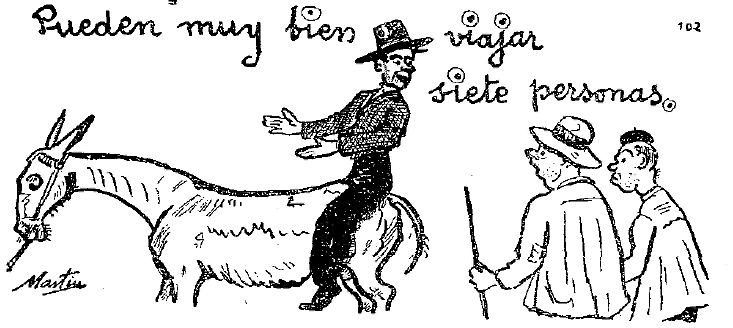
| Языки :: Испанский |
| Аудио |
 |
|
|
311 |
Español |
Spanish |
|
Lección Ciento dos (102) |
||
| Delante del garage (continuación) |
Before [of-]the garage (continued). |
|
| 1 |
Ya veo que entiendes de mecánica. — Eso no sé... pero no será por falta de experiencia. Porque todavía sigue la serie fatal; atiende (1) : |
I see that you understand [of] mechanics. — I don't know that... but it will not be through lack of experience. For the fatal sequel [series] still continues; listen : |
| 2 |
Al viaje siguiente, se me fué toda el agua del radiador por
un agujerito y se calentó el motor (2). Pero hay más : |
in the following trip, all the water of my radiator has gone through a little hole and the engine ran hot. But there is more : |
| 3 |
anteayer, me fallaron los frenos en una revuelta, no sé si
por haberse roto un cable o por qué fué; ello es que me fui a dar un trastazo contra un árbol (3). |
(the day) before yesterday the brakes failed me in a bend, I don't know whether it was a connecting-wire that broke [for a c. w. having broken] or what happened [was] : the fact is that I went and struck against a tree.. |
| 4 |
Pero gracias a Dios no fué nada : el eje delantero torcido, una aleta abollada, los faros rotos y algunos rasguños en la carrocería. |
But thanks to God, it was nothing : the front axle twisted, a mud-guard bumped in, the headlights broken, and a few scratches on the bodywork. |
| 5 |
Yo salí ileso (4). Además acertó a pasar por ahí un camión (5) que en seguida paró y como afortunadamente traía un cable me pudo remolcar hasta aquí. En medio de todo, tuve suerte. |
I came out safe and sound. Besides a lorry happened to pass that way, which stopped at once, and as, by luck, it possessed [carried] a cable, it could tow me up to here. In spite of all [in the middle of all] I had luck. |
| 6 |
¡Vaya una suerte! Pues te va resultando cara la ganga que tu decías. |
Here's some luck ! Well it costs you [goes resulting] dear the bargain that you spoke of. |
| 7 |
Ya lo veo, ya... Oye ¿no conocerías por casualidad algún comprador que de mecánica no entienda más que yo... porque, si no, ¿sabes? nunca cargará con este cacharro (6). |
I do see that, yes... Listen, would you not know, by chance, some buyer who, in way of mechanics, should not be more proficient than I?... for, if (it is) not (the case), he will not encumber himself with that crock (of a car). |
| EJERCICIOS | EXERCISE : | |
| Anuncio. | ||
| 1 |
¿Por qué amontonarse en una carrocería demasiado
pequeña, cuando en un « Limón familiar » 10 caballos, pueden muy bien viajar 7 personas con todas las comodidades de un departamento de primera clase y a precio inferior al billete de tercera? |
An ad. |
| Características de este modelo : aletas envolventes, de una sola pieza; ruedas independientes; motor flotante; | Salient features of this type : all-of-a-piece enveloping mudguards; independent wheels; floating engine; | |
| cambios de marcha silenciosos; carrocería aerodinámica; cristales inastillables; parachoques cromados; amortiguadores hidráulicos. | silent speed-gear; aerodynamic bodywork; unbreakable windows; chromium-plated bumpers; hydraulic shock-absorber. | |
| 2 |
Copla Cruz de mayo sevillana, Cruz de mayo que en mi patio levanté, ¡ sabe Dios si en toa la vía, ya no te volveré a ver! Cruz de mayo sevillana. |
|
|
— This copla alludes to a Sevillan custom of setting up in inner courts
(patios) a flower-decked cross, during the month of May; a devotional custom similar to the Catholic "month-of-Mary poles" in France and May poles in England. |
||
| Toa la via the Andalusian pronunc. of : toda la vida. | ||
| NOTES. | |
| 1 |
Entender de una cosa, to understand a thing.
|
| 2 |
Se me fué toda el agua del radiador, liter. : all the water of
the radiator went me out. It is very current in Spanish (and French) to use reflexive pronouns, either as a filling-out (expletive) word, or to replace a possessive adjective (as is the case here). (Cf. in English, the expletive use of the pronoun, or possessive adjective, as tin (sic.): They thrashed you the wicked beast or they thrashed your wicked beast) (S. Revision lesson 105, par. 3.) |
| 3 |
Ello es que, the fact
is that; |
| 4 |
Ileso (ileso),
unharmed, safe and sound. |
| 5 |
Acertó a pasar, happened to pass. |
| 6 |
Cargar con, to encumber (oneself) with (any
unpleasant job); |
